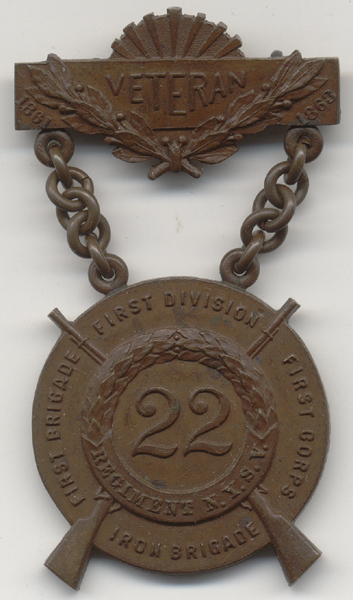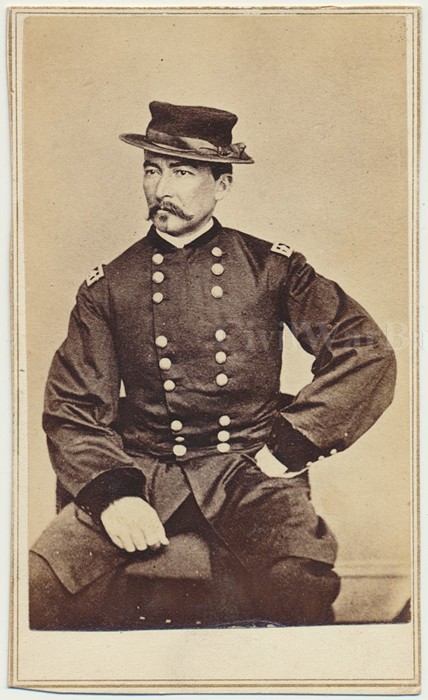LT. GENERAL PHILLIP H. SHERIDAN
Item #: CWB12136
Click on an image to enlarge
Sheridan, Philip H., major-general, was born at Albany,
N. Y., March 6, 1831, but while he was yet in his infancy his
parents removed to Somerset, Ohio, and some of his earlier
biographers have made the error of naming the latter as the
place of his birth. His father was a contractor for the
building of roads, and was away from home a great deal, so
that Sheridan was reared by his mother and at the village
school learned the rudimentary English branches. The ambition
to be a soldier had already evinced itself, but as soon as he
could do so he entered a country store at a salary of $24 per
year; thence he went to another store, where his pay was $60
per annum, and finally secured a situation where he earned
$12O for twelve months' labor as book-keeper and general
manager, It is said that up to the time he was sixteen years
old he had never been ten miles away from Somerset after his
parents located there. At this period he applied to the
member of Congress from his district for an appointment as
cadet at the United States military academy. The answer was
the enclosure of his warrant as such cadet, and the direction
that he report at the academy on June 1, 1848. Passing the
preliminary examinations without trouble, he was aided by
Cadet H. W. Slocum of New York, who was his roommate, in
studies of which he knew nothing upon his entry into the
institution. In 1852, his graduating year, Sheridan was
suspended from the academy for his action in some trouble with
another cadet, but he afterward joined the class of 1853 and
was graduated with it, rating the thirty-fourth in a class of
fifty-two. He was assigned to the 1st U. S. infantry, but was
soon afterward transferred to the 4th. In 1856 he was
stationed in Washington territory, defending the cascades of
the Columbia river against Indians. In May, 1861, he became a
captain, and in December was appointed chief quartermaster and
commissary in southwest Missouri, on the staff of Maj.-Gen.
Curtis. He was quartermaster at Gen. Halleck's headquarters
in April, 1862, but in response to an application from the
governor of Michigan, who wanted an educated soldier to
command the 2nd Mich. cavalry, Sheridan was made its colonel,
and so received his first command. In the advance on Corinth
he participated in several engagements, and on June 2, 1862,
he was placed in command of the 2nd cavalry brigade of the
Army of the Mississippi. At the battle of Booneville on July
1, where he was attacked by a force of Confederates at least
4,500 strong, he converted his defense into an offensive
movement by detaching a part of his force to take his foe in
the rear and flank, and the surprised enemy, utterly routed,
fled from the field. For this he received his star and
commission as brigadier-general of volunteers, dating July 1;
on Oct. 1 he found himself in command of the 11th division of
the army, and on the 8th of that month he took part in the
sanguinary battle of Perryville, holding the key-point of the
position and defending it successfully against several attacks
of the enemy. In the battle of Stone's river Sheridan
sustained four separate attacks, and four times repulsed the
enemy. On recommendation of Gen. W. S. Rosecrans, the U. S.
commander in that engagement, he was now made major-general of
volunteers, dating from the first day of the battle of Stone's
river. He remained with the Army of the Cumberland in its
march toward the Chickamauga creek, and in the battle of that
name, Sept. 19-2O, 1863, he did his best to beat back the
furious storm which so nearly destroyed the Federal army, and
he never displayed more stubborn courage or military skill in a
subordinate sphere than on that eventful day. The battle of
Missionary ridge was fought two months later, and it was
Sheridan who, with his division, carried the ridge under a hot
enfilading fire from thirty pieces of Confederate artillery,
and a tempest of musketry from well-filled rifle pits on its
summit; worked his way up to the front till he reached the
highest crest, and then went thundering down the ridge until
within 500 yards of the headquarters of the Confederate
commanding general, Bragg. Competent authority declares that
in this battle he really did as much as in any other to earn
what finally came to him, the generalship of the U. S. army.
He took command of the cavalry of the Army of the Potomac on
April 4, 1864, and at once set about making it a fighting
force, rather than a defensive picket-line for the infantry and
artillery. In June he was sent to cut the Virginia Central
railroad and unite with Gen. Hunter, who was then marching up
the valley of Virginia, and it was expected that this movement
would draw off the Confederate cavalry and leave the James
river free to the unimpeded passage of Gen. Grant's army. It
did so, Sheridan having on his route, however, to fight a smart
battle at Trevilian Station, as he also did at Darbytown, Va.,
in the month of July. Soon thereafter Sheridan came to the
leadership of the Army of the Shenandoah, by direct appointment
of Gen. Grant, after personally visiting Sheridan, and without
consulting the government at Washington. Sheridan attacked
Early on Sept. 19, and after a severe struggle scattered the
enemy in all directions, sending them "whirling through
Winchester," Va., and on Sept. 22, after pursuing Early, struck
him again in flank and rear at Fisher's hill where the Virginia
valley is but three miles wide. While he was in Winchester on
Oct. 19, his wily foe, Early, surprised the Federal forces in
their camp at Cedar creek, and drove back large portions of
them for six or seven miles in great disorder. This occasioned
the famous ride celebrated in song and story, and what appeared
like disastrous defeat was turned into a decided victory.
Sheridan was at once made a major-general in the U. S. regular
army, in President Lincoln's words, "For the personal
gallantry, military skill, and just confidence in the courage
and gallantry of your troops, displayed by you on Oct. 19, at
Cedar run, whereby, under the blessing of Providence, your
routed army was reorganized, a great national disaster averted,
and a brilliant victory achieved over the rebels for the third
time in pitched battle within thirty days." Gen. Sheridan's
career from this time until the surrender of Lee is a part of
the history of the final days of the war, and after the
surrender he had charge of the Department of the Gulf, and
later he was commander of the Department of Missouri. He was
made U.S. lieutenant-general in 1869, when Gen. Grant was
elected president, the western and southwestern military
divisions of the United States were under his command in 1878,
and when Gen. Sherman was retired in 1883, Sheridan became
general-in-chief of the regular army, being the nineteenth
officer who had attained that rank. Gen. Sheridan died at
Nonquitt, Mass. Aug. 5, 1888.Shipping Weight:
0.45 lb
Item # CWB12136
$200.00 USD



